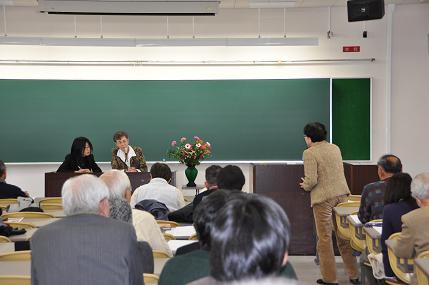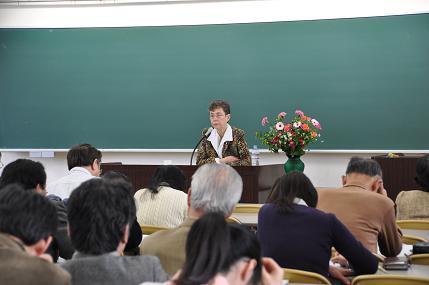Center for Interdisciplinary Study of Monotheistic Religions(CISMOR)Doshisha University
> Public Lectures > The RAMBAM as a Mediterranean PhilosopherPublic Lectures
Public Lecture by Project 1
The RAMBAM as a Mediterranean Philosopher
| Date: |
2009/12/19 13:00 - 15:00 |
|---|---|
| Place: | Room S21, Shisei-kan 2F Imadegawa Campus, Doshisha University |
| Lecture: | Sarah STROUMSA, Rector of the Hebrew University / Professor of dept. of Arabic Language and Literature |
| Summary: | |
|
The lecturer, Professor Sarah Stroumsa, spoke about Moses Maimonides (Rambam), an important figure in the history of the Jewish people and one of the most distinguished Jewish thinkers in medieval times, and shed light on his philosophy, which is just one part of his extensive range of intellectual activities, in the context of “the world of Mediterranean culture.” Conventional study of Maimonides has performed only insufficient analysis of his relationship with the Islamic world. While Maimonides was involved in various social activities, his contribution has usually been discussed in the context of Jewish society only, and little attention has been paid to his association with the Islamic world. Though the relevance between his thought and Islamic philosophy has been pointed out in the fields of philosophy and in some scientific areas, in-depth study has not yet been conducted on how his philosophy is integrated into the entire picture of Islamic philosophy. Therefore, we have the impression that he undertook his activities independent from other cultures and had nothing to do with their development. To avoid such a misunderstanding, the lecturer employed a comprehensive approach to understand the Mediterranean world as the home of integrated cultures, or as “a single unit,” if we use the term of Fernand Braudel. In doing so, she attempted to shed light on the activities of Maimonides in a cultural context. It resulted in her finding that Maimonides concurrently belonged to several sub-cultures that together constituted one Mediterranean world and that the outcomes of his intellectual activities reflected the nature of the multi-layered structure of these sub-cultures. Such a characteristic of multi-layered cultural structure had not only synchronic but also diachronic dimensions, encompassing a variety of religious traditions. Maimonides developed his own unique thought through archaeological excavations of cultural heritage sites and by having dialectical dialogues with these sites, without neglecting the multi-layered nature of individual cultural traditions. In developing this thought, Maimonides was affected, in no small measure, by the political situation of the Mediterranean world of his days. In 1135, Maimonides was born in Cordoba, which was under the rule of the Almoravid Dynasty. When the Almohads conquered Cordoba and began persecuting Christians and Jews, Maimonides’ family fled to Fes in North Africa, and then to Palestine, which was controlled by the Crusaders. Eventually, they settled in Egypt under the rule of the Fatimid Dynasty. During this period of exile, Maimonides came under the rule of four Islamic regimes and had opportunities to learn from the scholars, who supported the respective regimes, in the fields of the Islamic law and philosophy. Throughout the hardships in his life, Maimonides was exposed to a great variety of cultures and regimes. Though Maimonides called himself an “Aristotelianist,” considerable influence from the Arabian culture is seen in his understanding of Aristotle’s philosophy, in light of the commentaries he recommended to his pupils. His interest in astronomy, medicine, and mathematics, which he regarded as important parts of philosophy, also implies the multi-layered nature of his intellectual activities. Maimonides, as such, deserves to be called a man who symbolizes the Mediterranean world, the home of integrated cultures. It should be noted, however, that Maimonides is one of the very few thinkers who succeeded in integrating such diverse cultures within themselves. Maimonides’ personal quality that enabled him to do so emphasizes the unequalled distinctiveness and greatness of his thought. Souki Yamashita (Research Assistant, Graduate Student of School of Theology, Doshisha University) |
|
|
*This lecture is given in English, with Japanese consecutive interpretation. *Admission Free, No reservation necessary *Inquiry: 075-251-3972(CISMOR) |
|
|
Program(Japanese) |
|

